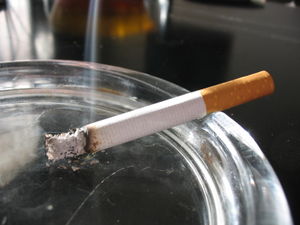The best way to stop smoking is to just stop - no
ifs, ands or butts. ~Edith Zittler
 There's
no question about the adverse effects of smoking on all stages of
pregnancy, as there have already been countless studies made on
the matter. From conception to growth and reproduction to birth
and early childhood development, smoking affects various systems
and the dangers it poses to both the mother and the baby cannot
be emphasized enough.
There's
no question about the adverse effects of smoking on all stages of
pregnancy, as there have already been countless studies made on
the matter. From conception to growth and reproduction to birth
and early childhood development, smoking affects various systems
and the dangers it poses to both the mother and the baby cannot
be emphasized enough.
Most smokers sincerely want to quit. They know cigarettes
threaten their health, set a bad example for their children, annoy
their acquaintances and cost an inordinate amount of money.
Nobody can force a smoker to quit. It's something
each person has to decide for himself, and will require a personal
commitment by the smoker. What kind of smoker are you? What do you
get out of smoking? What does it do for you? It is important to
identify what you use smoking for and what kind of satisfaction
you feel that you are getting from smoking.
Many smokers use the cigarette as a kind of crutch
in moments of stress or discomfort, and on occasion it may work;
the cigarette is sometimes used as a tranquilizer. But the heavy
smoker, the person who tries to handle severe personal problems
by smoking heavily all day long, is apt to discover that cigarettes
do not help them deal with their problems effectively.
When it comes to quitting, this kind of smoker may
find it easy to stop when everything is going well, but may be tempted
to start again in a time of crisis. Physical exertion, eating, drinking,
or social activity in moderation may serve as useful substitutes
for cigarettes, even in times of tension. The choice of a substitute
depends on what will achieve the same effects without having any
appreciable risk.
Did you know?
The following are just some of the findings gathered from
scientific research:
> Smoking can wreak havoc on your menstrual
cycle, affecting your capacity to get pregnant;
Testosterone levels in men are greatly reduced by smoking, affecting
the quality and the development of sperm;
Male smokers have more problems in getting and/or maintaining
an erection;
Smokers generally suffer from infertility more than do nonsmokers;
Low birth weights and premature births have been associated
with smoking while pregnant;
Smoking during pregnancy has been associated with ectopic pregnancies,
spontaneous abortions, and higher levels of miscarriage;
Complications at birth and the risk of sudden infant death syndrome
(SIDS) have been linked to smoking;
Heavy smokers were found to have greater risks of having babies
with a harelip or cleft palate.
|
Once a smoker understands their own smoking behavior, they will
be able to cope more successfully and select the best quitting approaches
for theirselve and the type of life-style they lead.
Because smoking is a form of addiction, 80 percent of smokers who
quit usually experience some withdrawal symptoms. These may include
headache, light-headedness, nausea, diarrhea, and chest pains. Psychological
symptoms, such as anxiety, short-term depression, and inability
to concentrate, may also appear. The main psychological symptom
is increased irritability. People become so irritable, in fact,
that they say they feel "like killing somebody." Yet there
is no evidence that quitting smoking leads to physical violence.
Some people seem to lose all their energy and drive, wanting only
to sleep. Others react in exactly the opposite way, becoming so
over energized they can't find enough activity to burn off their
excess energy. For instance, one woman said she cleaned out all
her closets completely and was ready to go next door to start on
her neighbor's. Both these extremes, however, eventually level off.
The symptoms may be intense for two or three days, but within 10
to 14 days after quitting, most subside. The truth is that after
people quit smoking, they have more energy, they generally will
need less sleep, and feel better about themselves.
 Quitting smoking not only extends the ex-smoker's life, but adds
new happiness and meaning to one's current life. Most smokers state
that immediately after they quit smoking, they start noticing dramatic
differences in their overall health and vitality.
Quitting smoking not only extends the ex-smoker's life, but adds
new happiness and meaning to one's current life. Most smokers state
that immediately after they quit smoking, they start noticing dramatic
differences in their overall health and vitality.
Quitting is beneficial at any age, no matter how long a person has
been smoking. The mortality ratio of ex-smoker decreases after quitting.
If the patient quits before a serious disease has developed, their
body may eventually be able to restore itself almost completely.
Want to learn more?
"So You Have Actively Trying To Get Pregnant" will go over all the important medical conditions, health risks and problem causing chemicals. We show you how they relate to pregnancy and steps to overcome possible problems